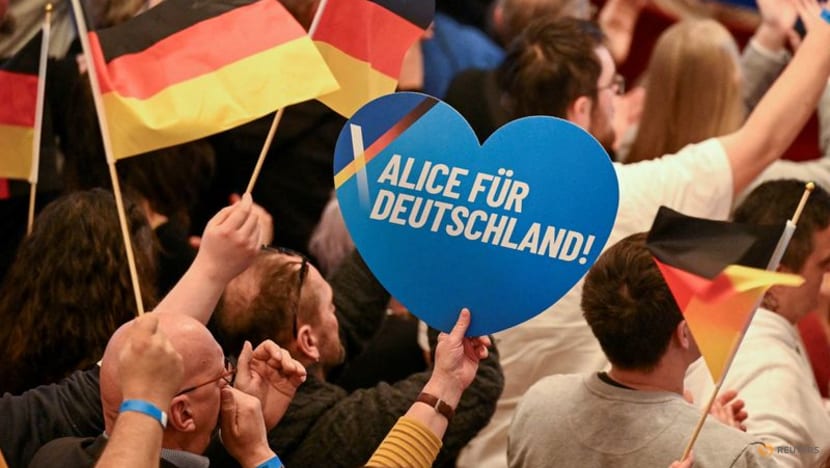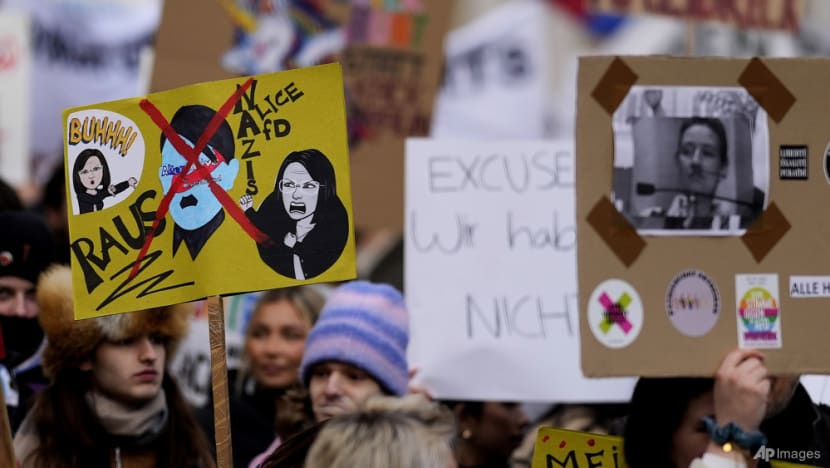Why is Germany’s far-right party set for its strongest election result yet?
Alternative for Germany is poised to place second after the country’s 60 million eligible voters cast their ballots on Sunday (Feb 23).

FILE PHOTO: People attend an election campaign event of the Alternative for Germany (AfD) in Heidenheim, Germany, February 9, 2025. REUTERS/Angelika Warmuth/File Photo

This audio is generated by an AI tool.
BERLIN: Germany is gearing up for a snap national election on Sunday (Feb 23), amid voter dissatisfaction over key issues like illegal immigration and law and order.
While the conservative Christian Democrats are the favourite to become the biggest party in power, polls show that the far-right Alternative for Germany (AfD) party is on course for its highest ever vote share.
Germany’s election is being held after Chancellor Olaf Scholz's three-way coalition collapsed late last year.
According to polls, AfD is poised to place second after the country’s 60 million eligible voters cast their ballots. But no matter how it fares, the party’s ascent has already shaken up the European political establishment.
It has even fielded its first-ever candidate for chancellor – AfD leader Alice Weidel.
DEADLY ATTACKS BOOSTED SUPPORT
To its supporters, the AfD is a voice for those frustrated with the policies and approaches of traditional parties on issues like immigration, economic disparity and a loss of German culture.
Germans have been reeling from a series of deadly attacks, including one in Munich earlier this month where a mother and her two-year-old daughter were killed in a car-ramming attack, allegedly carried out by an Afghan asylum seeker.
These attacks, some of which have been linked to migrants, have boosted support for AfD.
However, its critics have denounced the party for promoting populist and occasionally extremist far-right views. These include advocating mass deportations of illegal migrants, nationalism and Euroskepticism.
Counter-protests have become commonplace at AfD events.
"They want to destroy democracy; they want to deport millions of people and we've learned from history in Germany something you have to stand up,” a protester told CNA at an AfD rally at the outer suburbs of Berlin.

"The German people are very aware that it happened already once and it can happen again,” said another protester, referring to when the Nazis rose to power between 1933 and 1945.
“And that's why the people are here because they know it can happen … that we get a fascist state of Germany. And that, we don't want to accept.”
A strong showing by the AfD could further cement the populist right-wing shift already seen in other European countries.
In turn, this could pile more pressure on traditional parties to try and hold the centre against what appears to be the forceful currents of voter pushback.
CRITICISM FROM US
Nevertheless, it is unlikely that the AfD will enter government despite its strong showing in the polls, said observers.
Germany’s mainstream parties have long maintained a so-called firewall agreement between them – that is, a pledge not to partner or work with the AfD.
But in recent days, that pledge has faced some criticism from unexpected quarters.
In a speech at the Munich Security Conference on Feb 14, United States Vice President JD Vance shocked much of the German political establishment with a forceful attack on the practice.
“Democracy rests on the sacred principle that the voice of the people matters. There's no room for firewalls. You either uphold the principal or you don't,” said Vance, who was sworn into the White House last month.
"Europeans, the people, have a voice. European leaders have a choice and my strong belief is that we do not need to be afraid of the future, you can embrace what your people tell you even when it's surprising even when you don't agree,” he added.
Vance’s comments also came after billionaire Elon Musk, a key figure in US President Donald Trump's White House, publicly declared his support for the AfD.
This unprecedented intervention by a longstanding ally into German domestic affairs garnered a strong rebuke from Chancellor Scholz the following day, who said the country will not accept it if outsiders intervene in their democracy and elections.
He added: “That’s just not done, certainly not amongst friends and allies. We resolutely reject this.”
Related:
LANGUISHING ECONOMY
Apart from these issues, the state of the country's languishing economy is also high on the agenda.
The world's third largest economy is facing the prospect of a recession, with falling exports and increased competition from Asia dragging down growth.
Economists are predicting a third year of contraction in 2025, which would represent the longest period of stagnation in Germany since the end of World War II. This comes amid high energy prices, stubborn inflation and excessive red tape.
With Germany being the biggest country in the European Union, much of the continent will be watching out for the final vote tally.









.jpg?itok=XH7-E5Sb)





